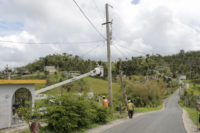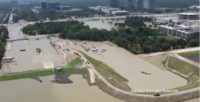As the 2022 hurricane season begins, cities such as Lake Charles, La., are still recovering from and repairing major damage caused by unprecedented back-to-back storms in 2020 and 2021.
After much anticipation, Louisiana and 12 other states, including Mississippi and Texas, will receive $3 billion in Community Development Block Grant-Disaster Recovery funds, the U.S. Dept. of Housing and Urban Renewal (HUD) announced March 22. But there is still much work to be done.
“A community should not have to wait almost two years for federal supplemental disaster aid to be deployed to citizens. It has not taken this long in the past and it should not have taken this long for Southwest Louisiana to receive this aid,” says Mayor Nic Hunter of Lake Charles, which suffered four federally declared natural disasters between August 2020 and May 2021.
The HUD funds, meant to advance disaster recovery efforts in 13 states and 10 local governments, will help regions recover from major storms of 2020 and 2021, and help build climate resilience.
The lack of federal funding—as well as the pandemic—created a paucity of recovery efforts, with many homes in the Lake Charles region remaining untouched. “This poor timeline has made the recovery process more cumbersome and, obviously, unnecessarily drawn out,” Hunter says.
“I get federal dollars are stretched, but I’ve never seen it take this long to recover from storm damage,” says Southwest Louisiana local Greta Willis, who serves as Operations Director for the non-profit Fuller Center Disaster ReBuilders. “It’s hard to understand when you’re not seeing it. Even people who live in New Orleans and Baton Rouge, they didn’t experience it like Southwest Louisiana did. It gets to be overwhelming. A lot of people here have lost hope.”
While FEMA’s boots-on-the-ground approach helped citizens meet their immediate needs, according to the mayor, the immediate response efforts gave way to long-term recovery needs. The assistance required from the federal government shifts from FEMA to agencies, such as HUD and their disaster recovery programs.
HUD is providing the state of Louisiana with $450 million in relief funds for Hurricane Laura and Delta, which happened in 2020, as well as $1.27 billion for the 2021 flooding and Hurricane Ida. Lake Charles receive additional funding of $10 million, according to HUD.
To date, Lake Charles has spent $100 million on recovery efforts, according to the mayor’s office. The total expected costs to repair city infrastructure, complete debris clean-up operations and the demolition of unsafe structures is projected to cost $250 million.
Hunter says the city is prioritizing cleaning and inspecting underground utilities, including drainage and wastewater infrastructure, and projects in great need of repair in order to create the largest impact in the shortest amount of time.
“We are working with consultants to maximize FEMA reimbursement for eligible expenses in order to minimize the long-term impacts to the city of Lake Charles' operating and capital budget,” Hunter says.
Lake Charles is also working to improve its water and wastewater infrastructure and harden assets at its treatment plants. “Using American Rescue Plan Act funds, we are in the process of installing automated water meter infrastructure for our more than 30,000 customers. This will help improve the accuracy of our billing and the leak detection technology will help us conserve our natural resources while providing us tools necessary for quicker restoration of services post-disaster,” Hunter says.
Putting Money Back Into the Community
The city of Lake Charles follows Louisiana’s bid law, and also tries to work with local contractors, when possible, putting money back into the community, Hunter says. The city is applying for numerous grants.
“In terms of the funding set to come, we will work in coordination with state, federal and other local governing agencies to make sure we are spending these funds in the most efficient way possible and in a way that stretches them as far as possible to provide the most widespread impact,” he explains.
Non-profit organizations, such as Fuller Center Disaster ReBuilders, have been crucial in helping rebuild the region. The group works to help victims of major disasters in the U.S. and focuses on assistance for uninsured homes for low-income families. Fuller Center Disaster ReBuilders was organized in the aftermath of Hurricane Katrina and has supported rebuilding in most of the major hurricanes since.
At almost two years post-Hurricane Laura, Lake Charles’ greatest challenge and need remain safe and secure affordable housing, according to various groups in the area.
“Numerous structures in the city still exist in a state of disrepair, some not having been touched since August 2020 when Hurricane Laura made landfall. Many of these homeowners are embroiled in battles with their insurance and many are simply needing help filling the gap between what their insurance or FEMA paid and the actual costs of repairs, which like everything else has skyrocketed due to labor and supply chain shortages,” Hunter says.
Many homeowners were uninsured and are still awaiting help from the federal government. According to the Lake Charles mayor’s office, about 7% of the population has yet to return to the community.
Fuller Center Disaster ReBuilders joined forces with other groups, such as Mennonite Disaster Services and the Louisiana Conference, to form a recovery aid coalition.
“From September 2021 to now, we’ve worked on 50 homes,” says Willis, who added that the coalition also brings in Amish volunteers from Ohio. “They helped us with more than double we could have done. It’s worked out really well for us.”
Local contractors in the region also volunteered their time and services in the wake of the storms, says ABC Pelican Chapter president and CEO David Helveston. Many member contractors did pro bono work in the Southwest region of Louisiana, putting roofs and tarps on houses.
“Louisiana has been hit two years heavily in row, specifically Lake Charles and Southwest Louisiana. Hurricanes Laura and Delta had huge impacts on the whole region. There are still blue tarps everywhere,” says Helveston.
Toni Karam Ratliff, who is the volunteer coordinator at Fuller Center Disaster ReBuilders, is grateful the funds from HUD have arrived. “It’s finally rolling out. We just keep working on multiple houses at the same time to keep things going and help as many people as we can. And even more of these funds can help. There is still so much work to be done,” Ratliff says.




Post a comment to this article
Report Abusive Comment